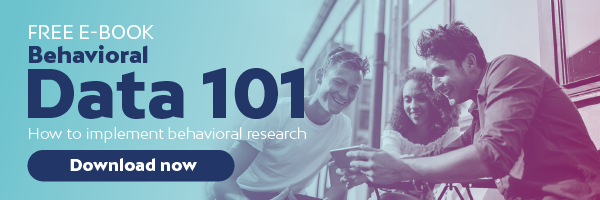I was very surprised when I discovered that beyond being an individual right, privacy is a fundamental right, recognized in the Universal Declaration of Human Rights of the United Nations Organization (UN).
This shows how preserving privacy has always been an obligation for governments, companies, institutions, researchers and society in general.
It’s a concern that has become more acute, with the emergence of a collective awareness of the personal data care which has led to better control of the information we share. And with laws coming into force, such as the General Data Protection Regulation (GDPR) and other local regulations.
With the behavioral data boom, and as professionals in the market research industry, a question arises that we must answer:
Do behavioral data violate privacy?
 No, so no need to be afraid. It is truth that observed data is "passive" data, but this doesn’t mean that it’s "unauthorized". Although behavioral data contains personally identifiable information (PII,) by using it, you don’t violate any law or regulation in the world.
No, so no need to be afraid. It is truth that observed data is "passive" data, but this doesn’t mean that it’s "unauthorized". Although behavioral data contains personally identifiable information (PII,) by using it, you don’t violate any law or regulation in the world.
Behavioral data allows you to track, among other things, the websites a person visits, the search terms used and which applications he/she uses on one or more devices. This activity is recorded through a tracker, which in the case of Netquest premium panelists, is installed with prior and full consent.
This online activity is delivered in the form of a clickstream data file. To collect this data, we have developed an algorithm that masks the parts of the URL that may contain PII. In this way, data can be collected and used without the risk of exposing personally identifiable information.
Additionally, each member of our online panel has an identifier. It is a unique alphanumeric code per individual that allows relating activities of the same individual, without the need to classify it by the person’s name.
How to respect panelists’ privacy?
- Take care of data transmission.
Remember not to share personally identifiable information. And make responsible use of the data, always for research purposes.
- Be transparent with participants.
Explain, in a clear and easy to understand language (avoiding legal jargon), what data you need to collect. Point out the purpose of the measurement, and always deliver something in exchange for the information they share with you.
- Ask for permission (and wait until is granted to you).
Any type of information about individuals should be collected with their express consent, according to the current market research code of ethics and legislation.
The authorization must be clear and concise. We recommend you to eliminate ambiguous expressions and avoid the “small letters” that are usually hidden in the terms and conditions.
- Make the farewell easy: goodbye, au revoir, arrivederci
Do not make it harder. If a panelist wishes to pause the tracker or leave the panel, he/she has the right to do so (and this is granted by the GDPR). Making this process complicated is unethical.
In fact, if the exit process is simple (and not traumatic), a bond of trust is created or reinforced. And this bond might be useful in the future to recover these participants.
Responsible use of data
 If you haven’t guessed it already, let’s outline it: the most important thing to do is to make responsible use of personally identifiable information. This means adopting correct and ethical behavior when collecting and analyzing behavioral data.
If you haven’t guessed it already, let’s outline it: the most important thing to do is to make responsible use of personally identifiable information. This means adopting correct and ethical behavior when collecting and analyzing behavioral data.
And the key to do so is to always think about the people. Place the participants at the center of your strategy. After all, the data is theirs. They have shared it and by doing so, they have trusted you.
Privacy should be conceived as a strategy, an element that has to be present in all your services from the moment of its conception.
Whether you collect the data or if you hire a provider to do so, always keep privacy as a concern. Complying with the law and following best practices is the responsibility of all actors involved in the investigation.
Explore more details about behavioral data and how to use them in your next research project by downloading our ebook.






